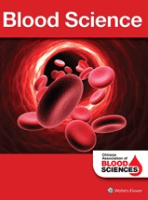
Blood Science
Scope & Guideline
Pioneering Research for Better Blood Health
Introduction
Aims and Scopes
- Hematological Malignancies:
Research on various blood cancers, including acute myeloid leukemia, multiple myeloma, and lymphomas, focusing on their pathogenesis, genetic mutations, and novel treatment approaches. - Translational Medicine:
Studies bridging laboratory research and clinical practice, including the evaluation of new therapies, prognostic models, and treatment outcomes in hematological patients. - Immune Modulation and Therapy:
Exploration of immune mechanisms in hematology, including CAR-T cell therapy, immune checkpoint inhibitors, and the role of the immune microenvironment in blood disorders. - Stem Cell Biology:
Investigation of hematopoietic stem cells, their differentiation pathways, and the impact of the bone marrow niche on stem cell function and disorders. - Epigenetics and Molecular Mechanisms:
Research on the epigenetic modifications and molecular pathways involved in hematopoiesis and hematological diseases, shedding light on novel therapeutic targets. - Iron Metabolism and Hematopathologies:
Focus on iron regulation in the context of hematological disorders, examining its implications in diseases such as anemia and myelodysplastic syndromes. - Microbiome and Hematopoiesis:
Studies investigating the interactions between gut microbiota and hematopoietic processes, highlighting their influence on health and disease.
Trending and Emerging
- Targeted Therapies and Precision Medicine:
Increasing emphasis on the development and application of targeted therapies, including CAR-T cell therapy and small molecular inhibitors, to improve outcomes in hematological malignancies. - Single-Cell Analysis Techniques:
Emerging use of single-cell RNA sequencing and other advanced techniques to understand the heterogeneity of hematopoietic cells and their implications in disease progression. - Gut Microbiota and Hematological Health:
Growing interest in the role of gut microbiota in influencing hematopoiesis and the immune response, highlighting its potential as a therapeutic target. - Epigenetic and Molecular Pathways:
A surge in research focusing on epigenetic changes and molecular mechanisms that drive hematological conditions, providing insights into novel treatment strategies. - Immune Microenvironment Reprogramming:
Emerging studies targeting the tumor immune microenvironment, particularly macrophage reprogramming, to enhance immunotherapy efficacy in blood cancers. - Biomarkers for Prognosis and Treatment Response:
Increased focus on identifying biomarkers that can predict treatment response and disease prognosis, facilitating personalized treatment approaches in hematology.
Declining or Waning
- Traditional Chemotherapy Approaches:
There is a noticeable decrease in studies focused solely on conventional chemotherapy regimens, as the field shifts towards more targeted and personalized treatment strategies. - Historical Treatments for Hematological Disorders:
Research centered on older treatment modalities, such as older immunosuppressive therapies or less effective transfusion methods, is becoming less common as new therapies emerge. - Basic Hematology Studies:
Basic studies that do not link findings to clinical applications or translational research are appearing less frequently, indicating a trend towards research that can directly impact patient outcomes.
Similar Journals
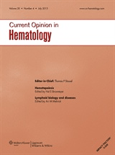
CURRENT OPINION IN HEMATOLOGY
Connecting groundbreaking research to clinical practice.CURRENT OPINION IN HEMATOLOGY is a leading peer-reviewed journal published by Lippincott Williams & Wilkins, focusing on the latest advancements and insights in the field of hematology. With an impressive impact factor and ranked in the first quartile (Q1) of its category, this journal serves as a vital resource for researchers, clinicians, and students seeking to stay informed on contemporary issues and emerging trends in hematological research and treatment. Established in 1994, it showcases critical reviews, expert commentary, and systematic analyses across a broad spectrum of hematology topics, contributing significantly to clinical and experimental knowledge through its robust editorial standards. While offering traditional subscription access, CURRENT OPINION IN HEMATOLOGY remains committed to providing a platform that bridges the gap between fundamental research and clinical application, making it indispensable for professionals dedicated to advancing patient care and scientific understanding in hematology.
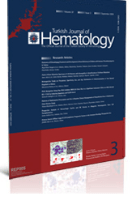
Turkish Journal of Hematology
Advancing hematological research for a healthier tomorrow.Turkish Journal of Hematology is an esteemed publication dedicated to advancing the field of hematology, producing influential research since its inception in 1999 under the auspices of GALENOS PUBL HOUSE. With an Open Access model, it facilitates widespread dissemination of knowledge, allowing researchers, clinicians, and students to stay abreast of the latest developments in blood disorders and treatments. With an ISSN of 1300-7777 and an E-ISSN of 1308-5263, the journal holds a commendable position in the academic community, evidenced by its 2023 Q3 ranking within the hematology category and its standing at #80 out of 137 in the Scopus database, placing it in the 41st percentile. Covering a wide scope of topics within hematology, this journal serves as a critical resource for disseminating innovative research and clinical practices pertinent to the ongoing challenges faced in this vital area of medicine. With its continuous publication until 2024, Turkish Journal of Hematology remains a beacon for enhancing the understanding and treatment of hematological conditions within the Turkish and global medical communities.
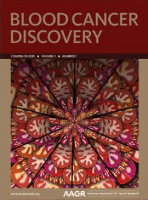
Blood Cancer Discovery
Catalyzing Change in Cancer Research LandscapesBlood Cancer Discovery is a premier academic journal published by the American Association for Cancer Research, dedicated to advancing the understanding of hematologic malignancies through cutting-edge research in the fields of oncology, biochemistry, and molecular biology. With an impressive impact factor and recognition as a Q1 journal across multiple disciplines, including cancer research and hematology, Blood Cancer Discovery serves as an essential platform for scholars and practitioners alike, facilitating impactful discourse and dissemination of pioneering findings. This open-access journal, established within the vibrant academic landscape of the United States, aims to bridge gaps in research and foster collaborations to ultimately enhance patient outcomes. Its Scopus rankings demonstrate its vital role in the critical advancement of cancer research and therapeutic development. By inviting contributions from a diverse range of disciplines, Blood Cancer Discovery is poised to drive innovation and inspire future advancements in understanding blood cancers.
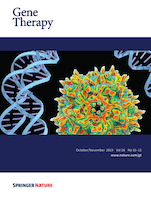
GENE THERAPY
Pioneering Innovations in Genetic HealingGENE THERAPY, published by SpringerNature, is a prestigious academic journal at the forefront of research in the fields of genetics, molecular biology, and molecular medicine. Since its inception in 1994, this journal has evolved into a vital resource for scholars, practitioners, and students, providing cutting-edge insights into gene therapy techniques and innovations. With an impressive impact factor reflecting its significant influence— ranking in the Q1 quartile across multiple categories in 2023—GENE THERAPY offers rigorous peer-reviewed articles that address both basic and applied aspects of gene therapy. The journal is recognized for its role in promoting advancements in therapeutic strategies, thus enhancing understanding of genetic disorders and treatment efficacy. Researchers will find this journal invaluable for publishing their findings, staying updated on the latest breakthroughs, and fostering interdisciplinary collaborations. Engage with the latest in gene therapy by accessing this influential platform, and contribute to a field that holds the potential to transform healthcare outcomes worldwide.
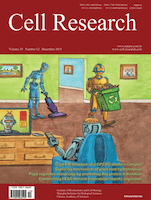
CELL RESEARCH
Exploring Innovations in Molecular BiologyCELL RESEARCH is a premier peer-reviewed journal dedicated to advancing the field of cell biology and molecular biology, published by SpringerNature. With an impressive impact factor and consistently ranking in the Q1 quartile for both cell biology and molecular biology, this journal serves as a pivotal resource for researchers, professionals, and students seeking to explore the latest discoveries and advancements in cellular mechanisms and their implications for health and disease. Since its inception in 1996, CELL RESEARCH has cultivated a distinguished reputation, currently boasting ranks in the top percentile of Scopus categories, reaffirming its influence and relevance to the scientific community. Although it is not an Open Access journal, its rigorous selection process ensures the publication of high-quality articles that contribute significantly to our understanding of life sciences. For those deeply engaged in the realms of biochemistry, genetics, and molecular biology, CELL RESEARCH is an essential conduit of innovative research and critical insights.

Journal of Blood Medicine
Empowering Research: Your Gateway to Innovations in HematologyThe Journal of Blood Medicine, published by DOVE MEDICAL PRESS LTD, stands as a vital resource in the field of hematology, focusing on the latest research developments and clinical advancements in blood medicine. With an impact factor reflective of its growing relevance, this open-access journal has been delivering quality scholarly work since 2010, ensuring that critical research is readily available to the global scientific community. The journal operates under an open-access model, further enhancing its dissemination and accessibility to researchers, professionals, and students alike. In the 2023 rankings, it secured a Q3 category status within hematology and achieved a commendable 76th rank out of 137 in Scopus listings, indicating its commitment to quality and innovation in this specialized area. Located in New Zealand, the journal's diverse topics encompass clinical research, treatment modalities, and emerging therapies, contributing significant insights vital for shaping future advancements in blood medicine.

Journal of Hematology
Advancing the Frontiers of Blood ScienceThe Journal of Hematology, published by ELMER PRESS INC, serves as a pivotal platform for disseminating cutting-edge research in the field of hematology. With an ISSN of 1927-1212 and an E-ISSN of 1927-1220, this journal is committed to advancing scientific knowledge and clinical practice through high-quality peer-reviewed articles encompassing all aspects of blood disorders, from basic science to health policy implications. While the journal currently operates under a traditional access model, it nonetheless prioritizes the rapid publication of significant findings, ensuring that researchers, clinicians, and students have timely access to the latest advancements in hematological research. Positioned to bridge gaps in knowledge and foster collaboration among scholars worldwide, the Journal of Hematology is an essential resource for anyone invested in this vital area of medicine.
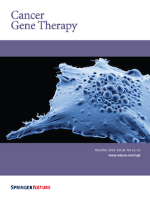
CANCER GENE THERAPY
Transforming Cancer Care Through Genetic InsightsCancer Gene Therapy, published by SpringerNature, stands at the forefront of research in the fields of cancer research, molecular biology, and molecular medicine. With a robust impact factor reflecting its significant influence—ranking in the Q2 category for cancer research and Q1 for both molecular biology and molecular medicine—it serves as an essential resource for scholars and practitioners alike. Since its inception in 1994, the journal has dedicated itself to advancing the understanding and therapeutic application of genetic innovations in oncology. Notably, it holds distinguished Scopus ranks, placing it among the top tier journals in its categories, underscoring its importance to the scientific community. While open access options are not available, the compelling research published here offers invaluable insights into the latest advancements and strategies in cancer therapy. Engaging with *Cancer Gene Therapy* not only keeps professionals informed but also inspires future innovations in the quest for effective cancer treatments.
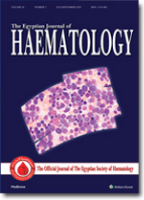
Egyptian Journal of Haematology
Shaping the Landscape of Hematology in the Middle EastThe Egyptian Journal of Haematology, published by WOLTERS KLUWER MEDKNOW PUBLICATIONS, stands as a pivotal resource in the field of hematology, particularly within the context of Egypt and the broader Middle Eastern region. This journal is dedicated to disseminating high-quality research that explores the latest advancements in blood disorders, hematologic malignancies, and transfusion medicine. With a focus on original research, case studies, and reviews, it aims to provide a comprehensive platform for hematologists, researchers, and healthcare professionals to enhance their understanding and management of hematological conditions. Although it is not an open-access journal, the rigorous peer-review process ensures that only the most impactful studies are published, contributing to the journal's reputation in the academic community. The Egyptian Journal of Haematology serves as an essential tool for advancing knowledge, improving clinical outcomes, and fostering collaboration among experts in the field.
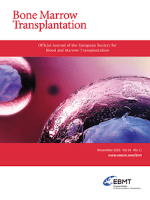
BONE MARROW TRANSPLANTATION
Unveiling New Horizons in Bone Marrow Transplantation.BONE MARROW TRANSPLANTATION, published by SpringerNature, stands as a leading journal in the fields of Hematology and Transplantation, as evidenced by its recognition in the Q1 category for both disciplines according to 2023 rankings. With an impressive impact factor and notable Scopus rankings—7th out of 54 in Medicine Transplantation and 25th out of 137 in Medicine Hematology—this journal is instrumental for researchers and professionals dedicated to advancements in bone marrow transplantation practices and research. Established in 1986, the journal publishes original research, clinical studies, and reviews that push the boundaries of current knowledge, making it essential reading for those looking to stay abreast of the latest developments in the field. Although offering limited Open Access options, BONE MARROW TRANSPLANTATION reaches a broad audience and furthers a global dialogue on best practices and innovative approaches in transplantation medicine. Its address in London, UK positions it at the heart of international research collaboration, fostering connections among scientists, clinicians, and students alike.